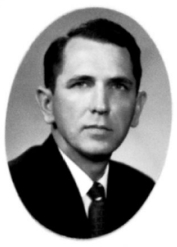Related Research Articles
Michael McGrath is an American lawyer and judge who served as the chief justice of the Montana Supreme Court from 2009 to 2025. He also served as the attorney general of Montana from 2000 to 2008. He is a veteran of the United States Air Force.

Grant Barry Anderson is a former associate justice of the Minnesota Supreme Court. He previously served as a member of the Minnesota Court of Appeals.
Brent D. Benjamin is an American attorney who previously served as a justice of the Supreme Court of Appeals of West Virginia. In 2004,he was the first Republican elected to the West Virginia Supreme Court in more than 80 years,defeating incumbent Justice Warren McGraw. In 2015,the West Virginia Legislature changed the election system for judicial officers to a non-partisan basis. In 2016,Benjamin placed fourth of four serious candidates in the non-partisan election,with 12% of the vote,and left the court in January 2017,to return to private practice.
Janice Marie Holder is an American judge who served as a circuit court judge for Tennessee's Division II Circuit Court in the 30th district,served as the third woman justice on the Tennessee Supreme Court from 1996 until 2014,and was the first female Chief Justice of Tennessee on the Tennessee Supreme Court from 2008 until her retirement in 2014.

Leslie Harburd Southwick is a United States circuit judge of the United States Court of Appeals for the Fifth Circuit and a former judge of the Mississippi Court of Appeals.

Joseph Gardner Wilson was a U.S. Republican politician in the state of Oregon. A native of New Hampshire,he served as a state circuit court judge and as a justice of the Oregon Supreme Court,and was elected to the United States House of Representatives. Wilson died shortly after assuming office in the House.
John Luke Hill Jr. was an American lawyer,Democratic politician,and judge. He is the only person to have served as Secretary of State of Texas,Texas Attorney General,and Chief Justice of the Texas Supreme Court.
Faith Enyeart Ireland is an American lawyer,mediator,and former judge in the state of Washington. She was a county trial judge for 15 years before serving as an associate justice on the Washington Supreme Court from 1999 to 2005. Ireland is also a world champion powerlifter.

William Joel Blass was an American war veteran,attorney,educator,and politician.

One justice of the North Carolina Supreme Court and three judges of the North Carolina Court of Appeals were elected by North Carolina voters on November 6,2012,concurrently with the elections for Governor and other offices. North Carolina judicial elections are non-partisan. Terms for seats on each court are eight years. In three of the four races,incumbents were re-elected to their seats,but incumbent Court of Appeals Judge Cressie Thigpen was defeated by Chris Dillon.
Penny J. White is an American attorney and former judge who served as a judge on Tennessee's First Judicial Circuit,a judge for the Tennessee Court of Criminal Appeals,and a justice on the Tennessee Supreme Court. she was the second woman to serve on the Tennessee Supreme Court. White was removed from office in a judicial retention election in 1996 as the only justice to lose a retention election in Tennessee under the Tennessee Plan. After her time in the judiciary,White served as a professor at the University of Tennessee College of Law until retiring in 2022.

Four justices of the seven-member North Carolina Supreme Court and four judges of the 15-member North Carolina Court of Appeals were elected by North Carolina voters on November 4,2014,concurrently with other state elections. Terms for seats on each court are eight years.
Laurie McKinnon is an associate justice of the Montana Supreme Court. She was elected to her first eight-year term in 2012. In 2020,she defeated Mike Black,gaining a second eight-year term.
Courtney Rae Hudson is an American lawyer who has served an associate justice of the Arkansas Supreme Court. She was elected to the position in 2010.

James W. Kitchens is an American jurist who served as a justice of the Supreme Court of Mississippi for the Central District from 2009 to 2025. He served as one of two presiding justices,from 2017 to 2025. A graduate of the University of Southern Mississippi and the University of Mississippi School of Law,Kitchens was elected the district attorney for Mississippi's 14th Judicial District three times from 1971 to 1982,representing Copiah,Lincoln,Pike,and Walthall counties. During his tenure as district attorney,he survived an assassination attempt that resulted in wounds to his hand and leg.

Bernette Joshua Johnson is an American lawyer from New Orleans,who served as the chief justice of the Louisiana Supreme Court from 2013 to 2020.

Sydney McCain Smith was a justice of the Supreme Court of Mississippi from 1909 to 1948,and its chief justice starting in 1912. His 39-year tenure made him "by far the longest-serving Mississippi Supreme Court justice".
Edward Turner was a state legislator and public official who served as Justice of the Supreme Court of Mississippi from 1824 to 1832,and again from 1840 to 1843.
Richard Forman Reed was an American state legislator and justice of the Supreme Court of Mississippi from 1912 to 1915.
Dirk M. Sandefur is an American lawyer who served as an associate justice of the Montana Supreme Court from 2017 to 2025. He served for eight years as a criminal and civil deputy attorney for Cascade County,Montana,before being elected a judge on the 8th Judicial District of the Montana District Court in 2002. He ran for and won election to the Montana Supreme Court in 2016.
References
- 1 2 3 4 Leslie Southwick, Mississippi Supreme Court Elections: A Historical Perspective 1916-1996, 18 Miss. C. L. Rev. 115 (1997-1998).
- ↑ https://law-db.mc.edu/judicial/judge_profiles.php#mcrae Mississippi College Judicial Data Project entry on Chuck McRae
- ↑ "FindLaw's Supreme Court of Mississippi case and opinions". Findlaw.
- ↑ Robert Lenzner and Matthew Miller, Buying Justice, Forbes (July 21, 2003)
- ↑ Gates, Jimmie E. "Former state high court Justice McRae in ICU after scuba diving incident in Cozumel". The Clarion-Ledger.
- ↑ "This former Supreme Court justice isn't ready to ride off into the sunset" .